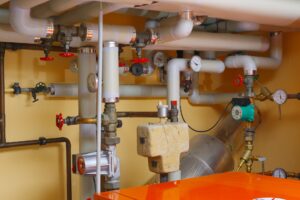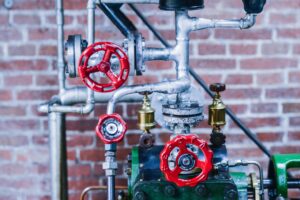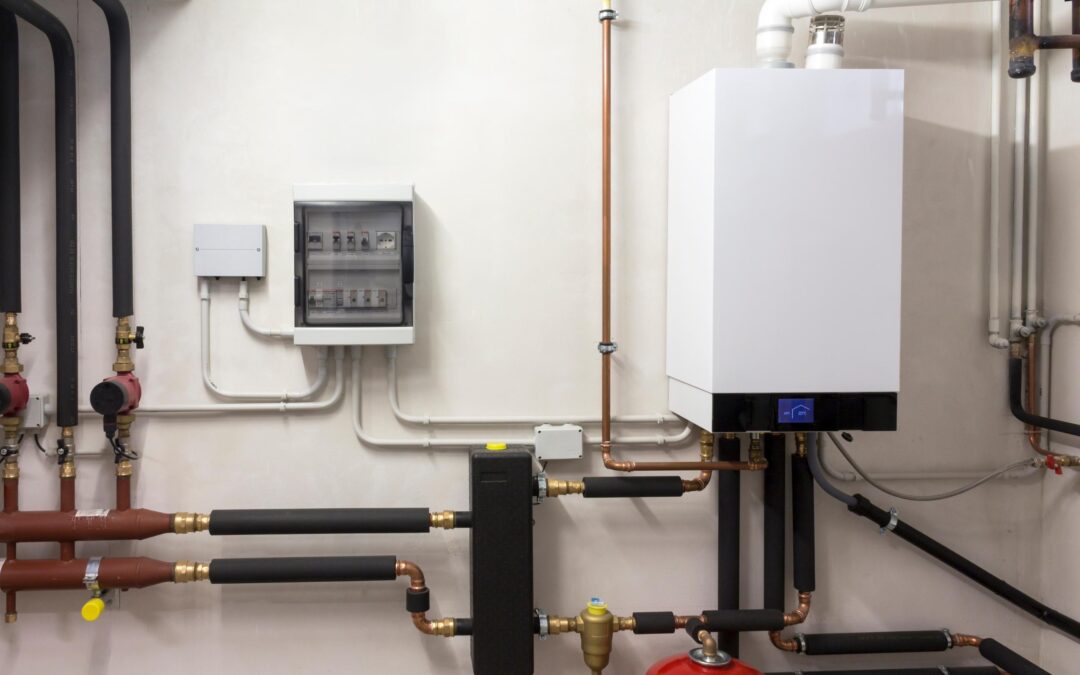Gas boilers are popular because they are efficient, reliable, and cost-effective for heating buildings. However, professionals must install and maintain them to ensure they work safely and efficiently. Regular check-ups and cleaning are necessary to keep them running smoothly and to ensure they do not produce harmful gases like carbon monoxide. So, do you know when to replace a gas boiler?
When to Replace Gas Boiler
Deciding when to replace a gas boiler depends on several factors:
Age of the Boiler
Gas boilers provide warmth and comfort to homes and buildings, but like any mechanical system, they have a finite lifespan. Typically, gas boilers are expected to last around 10 to 15 years before showing signs of wear and tear. As a boiler approaches or surpasses this age range, homeowners should consider the possibility of replacement.
The age of a boiler is a crucial indicator of its reliability and efficiency. Over time, components may deteriorate, leading to decreased performance and potentially higher maintenance costs. Older boilers are also likely to be less energy-efficient than newer models, which can result in higher utility bills.
Furthermore, technological advancements have led to developing more efficient and eco-friendly boiler systems. Newer models often boast improved energy efficiency ratings, reducing energy consumption and environmental impact.
While it may be tempting to postpone boiler replacement due to the initial cost, investing in a new, energy-efficient model can lead to long-term savings on energy bills and maintenance expenses. Additionally, modern boilers offer enhanced safety features, providing homeowners with peace of mind.
Efficiency
As the backbone of many households’ heating systems, the efficiency of gas boilers plays a pivotal role in both comfort and cost-effectiveness. With technological advancements continually reshaping the landscape of home heating, older boiler models often need to catch up to their newer counterparts in terms of efficiency. Over time, wear and tear can degrade the performance of older boilers, causing them to operate less efficiently than when they were first installed. Consequently, homeowners may notice a gradual uptick in energy bills or a decline in the boiler’s ability to heat their homes adequately.
Recognizing these telltale signs of inefficiency is crucial for informed decision-making regarding boiler replacement. Upgrading to a more efficient model can yield numerous benefits beyond reducing energy expenses. Newer boilers are engineered to maximize heat output while minimizing fuel consumption, resulting in lower operating costs and reduced environmental impact. Moreover, advancements in boiler technology often translate to enhanced reliability and longevity, sparing homeowners the inconvenience and expense of frequent repairs.
In essence, investing in a modern, high-efficiency boiler represents a proactive step towards achieving greater comfort, cost savings, and sustainability within the household. By staying attuned to the performance of their existing boiler and considering the advantages of upgrading to a more efficient model, homeowners can optimize both their heating experience and financial well-being in the long run.
Repair Frequency and Cost
When considering a gas boiler’s lifespan and performance, repair frequency and associated costs are critical indicators of its overall health and viability. If a boiler necessitates recurrent repairs or the expenses associated with these fixes escalate, homeowners may find themselves at a crossroads where the cost-benefit analysis tilts toward replacement.
Frequent breakdowns disrupt the comfort and functionality of the heating system and incur ongoing expenses that can quickly accumulate. Each repair visit entails the cost of parts and labor, the inconvenience of scheduling appointments, and potential downtime while awaiting repairs. As repair bills mount, it becomes increasingly apparent that there may be more prudent financial decisions than investing in an aging and faltering boiler.
In such circumstances, replacing the boiler emerges as a more economically viable alternative in the long term. While the upfront cost of a new boiler installation may seem daunting, it pales compared to the cumulative expenses of ongoing repairs. Moreover, modern boilers are engineered for improved efficiency and reliability, assuring homeowners of reduced energy bills and fewer maintenance hassles in the years to come.
Ultimately, recognizing the signs of excessive repair needs and evaluating the associated costs can empower homeowners to make informed decisions about the future of their heating systems. By weighing the financial implications of continued repairs against the benefits of investing in a new, more dependable boiler, individuals can chart a course toward enhanced comfort, efficiency, and financial stability within their homes.
Energy Efficiency Ratings
Gas boilers’ energy efficiency ratings determine their long-term cost-effectiveness and environmental impact. Modern boilers are frequently engineered to achieve higher efficiency ratings than their older counterparts. This means they can extract more heat from the same amount of fuel, reducing energy consumption and lowering homeowners’ utility bills.
If your boiler needs to improve efficiency ratings, it may operate with unnecessary waste and inefficiency. Upgrading to a newer, more efficient model could represent a wise investment in the long run. While the upfront cost of a replacement may seem daunting, the potential savings on energy bills over the boiler’s lifespan often outweigh this initial expense. Therefore, considering the energy efficiency ratings of boilers is essential when evaluating heating systems’ economic and environmental impacts.

Safety Concerns
Ensuring the safety of your household is paramount when it comes to gas boilers. Signs of wear and tear or safety hazards like carbon monoxide leaks should never be overlooked. Carbon monoxide, a colorless and odorless gas, poses a severe threat as it can lead to poisoning and even death if undetected. Therefore, immediate action is imperative if your boiler exhibits any such indications of deterioration or safety risks.
Replacing the boiler promptly becomes critical to safeguarding the well-being of your household members. Although the decision to replace may entail initial costs, prioritizing safety is non-negotiable. Modern boiler systems often come equipped with advanced safety features and undergo rigorous testing to ensure compliance with safety standards. By investing in a new boiler, you not only mitigate the immediate risks but also gain peace of mind knowing that your heating system is designed to operate safely and reliably, promoting the welfare of your family for years to come.
Changes in Household Needs
As households evolve, so do their heating requirements. Factors such as an expanding family or renovations that increase the size of the living space can significantly impact the adequacy of your current boiler. If your household has grown or your heating needs have changed, assessing whether your existing boiler can still effectively meet these demands is essential.
A boiler that once comfortably heated your home may now struggle to maintain optimal comfort levels, particularly during peak usage. Inadequate heating can lead to discomfort and dissatisfaction among household members, highlighting the need to reassess your heating system.
Upgrading to a larger or more powerful boiler may be necessary to accommodate the increased heating demands of your expanding household. A larger boiler can generate more heat evenly throughout the home, ensuring consistent warmth and comfort in every room.
Moreover, advancements in boiler technology have introduced features that enhance efficiency and performance, further underscoring the benefits of upgrading. Newer models often incorporate advanced controls and zoning capabilities, allowing for personalized temperature settings and optimized energy usage tailored to your household’s needs.
While upgrading to a larger boiler may entail upfront costs, the long-term benefits can far outweigh the initial investment. An appropriately sized and efficient boiler ensures greater comfort and satisfaction, leading to potential energy savings and reduced utility bills.
In conclusion, changes in household needs necessitate a proactive approach to evaluating the adequacy of your heating system. By recognizing the signs of strain or inefficiency in your current boiler and considering your household’s evolving requirements, you can make informed decisions about upgrading to a larger or more powerful boiler that meets your heating demands effectively and efficiently.
Environmental Considerations
In today’s world, environmental consciousness has become increasingly important, with individuals and communities seeking ways to minimize their carbon footprint and mitigate the impacts of climate change. In this context, the choice of heating systems, such as boilers, plays a crucial role in determining the environmental impact of residential and commercial buildings. Fortunately, technological advancements have led to the development of greener alternatives, with newer boilers incorporating eco-friendly technologies and producing fewer emissions than older models.
One of the key factors driving the adoption of more environmentally friendly boilers is the imperative to reduce greenhouse gas emissions. Traditional boilers, particularly older models, often rely on fossil fuels such as natural gas or oil, which contribute to the release of carbon dioxide and other harmful pollutants into the atmosphere when burned for heating. In contrast, newer boilers leverage innovative technologies such as condensing boilers, which capture and reuse heat that would otherwise be wasted, resulting in higher efficiency and lower emissions.
Furthermore, modern boilers are designed sustainably, employing materials and manufacturing processes that minimize environmental impact. For example, many newer boilers feature high-efficiency components and insulation materials that improve performance while reducing energy consumption and lowering greenhouse gas emissions associated with heating operations. Additionally, manufacturers are increasingly incorporating recycled materials into the production of boilers, further reducing their ecological footprint.
Another Aspect to Consider
Another aspect to consider is the role of renewable energy sources in heating systems. In recent years, there has been a growing trend towards integrating renewable energy technologies such as solar thermal panels or biomass boilers with traditional heating systems to enhance their environmental sustainability further. By harnessing the sun’s power or utilizing organic materials as fuel, these systems can significantly reduce reliance on fossil fuels and lower emissions, making them an attractive option for environmentally conscious homeowners and businesses.
Moreover, upgrading to a more environmentally friendly boiler benefits the planet and offers tangible advantages to the individuals and organizations that adopt it. Reduced energy consumption translates into lower utility bills, resulting in cost savings over the boiler’s lifespan. Additionally, many governments and municipalities offer incentives or rebates for installing energy-efficient heating systems, further incentivizing the transition to greener technologies.
In conclusion, environmental considerations surrounding boiler choice are increasingly significant today. Individuals and businesses can proactively combat climate change and promote sustainability by opting for newer, more environmentally friendly models that incorporate greener technologies and produce fewer emissions. With the potential for reduced energy consumption, cost savings, and government incentives, upgrading to an eco-friendly boiler represents a win-win scenario for both the environment and those who embrace these innovative solutions.

Government Incentives
Government incentives for energy-efficient upgrades, such as replacing boilers, can significantly alleviate the financial burden associated with these investments. Homeowners should explore potential rebates or programs offered by local authorities or energy companies. These incentives aim to promote the adoption of sustainable technologies and reduce overall energy consumption, aligning with broader environmental goals.
By taking advantage of such programs, individuals lower their upfront costs and contribute to an eco-friendlier future. Therefore, it is prudent for homeowners to conduct thorough research and inquire about available incentives before proceeding with a boiler replacement. These initiatives benefit the environment and empower individuals to make cost-effective choices that enhance energy efficiency and home sustainability.
Overall, if your gas boiler is old, inefficient, costly, or poses safety risks, it’s likely time to consider replacing it with a newer, more efficient model. Consulting with qualified boiler professionals can provide valuable insight into whether replacement is necessary and what type of boiler best suits your needs.


Recent Comments